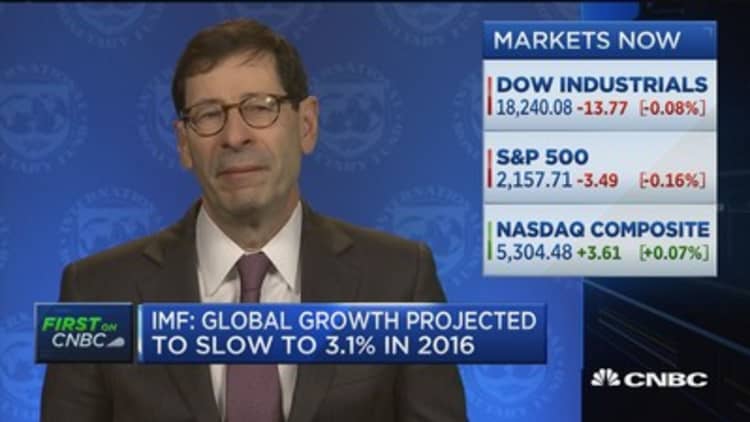Some may fear that globalization is under threat from populist politics, but that hasn't stopped many investors from seeing renewed opportunities in emerging markets and China.
From the surprise U.K. vote to leave the European Union to Donald Trump's call for tariffs on China and walling off Mexico, the protectionist movement has strengthened this year and prompted worries of recession as cross-border activity declines. The International Monetary Fund on Tuesday warned in its latest world outlook that reversing free trade policies would increase stagnation.
But some strategists say investors are thinking differently about global trends.
Today the world is in "a new structure of globalization — trade replaced by internal demand, ranging from consumption to services," said Pascal Blanque, global chief investment officer at Amundi, which has more than $1 trillion in assets under management. "This is a profound and structural change in this globalization" thinking.
In particular, emerging markets are the way "to get an exposure to those more endogenous, internal demand themes," he said.
The IMF expects a pickup in growth among developing economies to offset a slowdown in advanced economies, resulting in a net increase in global growth from 3.1 percent this year to 3.4 percent next year.

Major Wall Street firms have turned positive on emerging markets in the last several months. For example, BlackRock upgraded emerging market equities to an "overweight" rating in August, following Bank of America Merrill Lynch's reversal in April of a five-year negative view to dec;are itself "structurally bullish" on emerging markets.
Investors have been cautious on emerging market investments given their sensitivity to the battered commodity sector — the iShares MSCI Emerging Markets ETF (EEM) is still more than 30 percent below its pre-financial crisis peak.
But going forward, several analysts say it's important to focus on investing in emerging market subsectors whose growth isn't too dependent on commodity prices but comes instead from consumer-oriented industries.
EEM is up about 9 percent over the last 12 months, slightly better than the S&P 500's 8.5 percent gain. But a more focused emerging market fund such as the Emerging Markets Internet and E-commerce ETF (EMQQ) is up 32 percent over that time.
Emerging market "equity strategy is increasingly nuanced," Justin Leverenz, director of emerging market equities at OppenheimerFunds, said at the firm's EM Symposium last week.
Three industry themes Leverenz sees are health care, education and leisure, especially in China . Among the top holdings in Leverenz's Emerging Markets Innovators Fund and Developing Markets Fund are China's largest pharmaceutical firm Sinopharm, Chinese travel services site Ctrip.com and tutoring company TAL Education.
Such strategies highlight how emerging markets and China may increasingly be viewed as centers of innovation.
"I would say in the near future when the Chinese innovators, when the Chinese creative people, are able to share their work also in English with the international community … we will certainly discover there's a lot of creativity already in China," said Richard Attias, who has produced the World Economic Forum at Davos and heads the consulting firm Richard Attias and Associates.
He's also optimistic on longer-term growth in countries such as Argentina, and in areas such as renewable energy and agricultural innovations. "Today emerging markets are really investing in these two areas that are definitely the future," he said.
To be sure, the new investment thesis on emerging markets, particularly in China, depends on sustained consumer demand. China is in the middle of a major transition from an economy driven by manufacturing and exports to one supported by consumption and services, and the shift has been bumpy at times.
The China Beige Book, a private survey of Chinese business conditions, said in an advance look at the third quarter that metrics on the "old" economy strengthened while those of the "new" economy weakened.
China's economic growth is forecast to moderate from 6.9 percent last year to 6.6 percent this year and 6.2 percent in 2017, according to the IMF's latest projections. Emerging markets and developing economies as a whole should see growth pick up from 4.0 percent last year to 4.6 percent next year, the report said.
That far outpaces the IMF's estimate for U.S. growth of 1.6 percent this year and 2.2 percent next year.
While concerns around China's rapid economic rise are a factor behind anti-trade sentiment in the United States, "what's driving the protectionism as we look at it … the principle driver of it (is that) global trade doesn't seem to be inclusive," Michael Evans, president of Alibaba Group, said at the OppenheimerFunds Emerging Markets Symposium.
As a company supporting small businesses and consumers, "we believe (more inclusive global growth) can be executed through the Internet with great payments and great services," Evans said. He also said Jack Ma, executive chairman of Alibaba, has called for an alternative to the World Trade Organization with a World e-Trade Platform that would provide international rules eliminating barriers to e-commerce.


